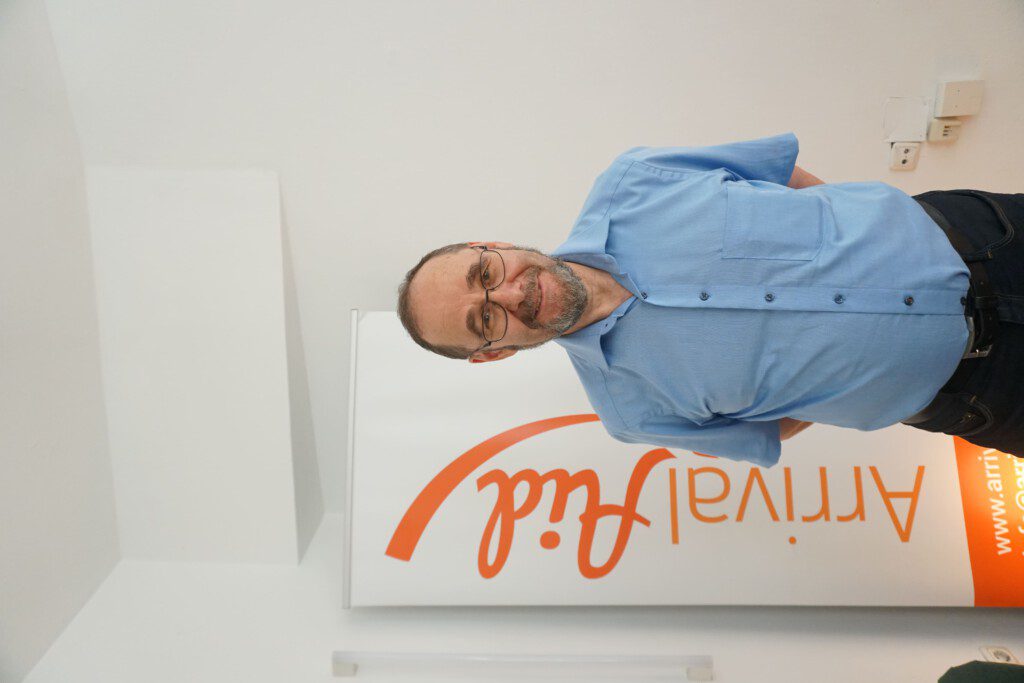Jan Mühlstein
Anhörungand Klagebegleitung at ArrivalAid

How did you get involved with ArrivalAid ?
One of my three daughters is friends with Cornelius Nohl and told me that Cornelius is planning to found an organization that wants to fill the gap in looking after refugees - i.e. in preparing and supporting them for asylum interviews. That interested me. I applied and was accepted into the first training group, that was in 2015.
How time-consuming is your commitment? How many hours a week do you volunteer?
This fluctuates very strongly. I took on a relatively large number of cases for a while, then took a long break and now I've started again. It depends on how many cases you have. I would say on average 2 to 3 hours a week, no more.
Is this your only volunteer position?
Since my studies, I have always volunteered for many organizations, e.g. B. Amnesty International, and I am active in a religious community.
Why did you decide to get involved?
I chose ArrivalAid because I was interested in the focus on one task. And it corresponded to my opportunities to get involved. I would not have had the time and perhaps not the ability to look after refugees in a group of helpers, even on a long-term basis. But I want to focus specifically on this topic.
In general, I consider volunteer work to be a given. The question is: Why don't you actually get involved? That's part of what you should bring into a society.
To what extent does your involvement with ArrivalAid benefit you on a personal level?
When I was 20, I fled Czechoslovakia for Germany after the Soviet army invaded Prague. This is certainly an experience that I can bring to ArrivalAid . Knowing what it's like when you arrive in a society you don't know your way around. But that wasn't my primary motivation.
I have always been concerned with the issue of asylum – more or less. We also founded an initiative in Gräfelfing – where I live – during the first wave of refugees. We wanted to get the community to provide spaces for refugees - unsuccessfully at the time.
Would you recommend that others volunteer?
Basically, I would recommend everyone to look for volunteer work. Especially in the phase of life I am in now – retired. In the first few years of retirement, it's also a positive thing to have something to do. But I think that it also broadens your horizons at a younger age when you go out of the familiar circles in which you move privately and professionally and get to know other worlds. It is very useful also for checking your own positions.
I can highly recommend ArrivalAid because it is an organization that thinks very carefully about how to prepare and support volunteers. I think the offers such as exchange of experiences, further training and supervision are very good. I don't know this so much from other organizations.
Is there an experience from your volunteer work that you particularly remember?
Some events remain in memory, probably especially the negative ones, e.g. B. the long waiting times at the BAMF (Federal Office for Migration and Refugees). I had a Anhörungwhere we were summoned at 8 a.m., the Anhörung took place at some point at 4 p.m. and we weren't finished until almost 9 p.m.
I think almost every encounter with one of the refugees I have cared for is a positive experience. You realize that you can actually make a difference, namely to help the refugee find his way and perhaps also to give him a bit more chances in the entire asylum process. Opportunities in the sense that he or she knows what is important, not in the sense of helping to gain recognition. I think that would be a false expectation of our work. As volunteers, we cannot ensure that the refugees are recognized; that is where we have the least influence. But we can contribute to a fair process and I believe that is not a small thing.
Anything else you'd like to say?
Just encouraging others to find a job with ArrivalAid . The spectrum of ArrivalAid has become much broader through Anhörungsbegleitung , and there are many options that you can take advantage of. Or: get involved elsewhere!
